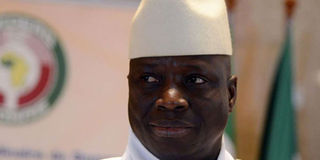Gambia appoints six new home-grown judges

This file photo taken on March 28, 2014 shows then Gambian President Yahya Jammeh attending the 44th summit of the 15-nation west African bloc ECOWAS at the Felix Houphouet-Boigny Foundation in Yamoussoukro. | PHOTO | ISSOUF SANOGO | AFP |
What you need to know:
- The Gambia's president swore in six new judges to top courts Monday, with Gambians dominating the list in a country that long relied on foreign justices under the former regime.
- Chief Justice Hassan Bubacar Jallow said the four appointed to the Supreme Court and two appointed to the Court of Appeal had all enjoyed "distinguished legal careers here and abroad".
- Jammeh attempted to name new judges to the court in January from Sierra Leone and Nigeria, but none of those nominated arrived for work at a moment of intense regional pressure on the Gambian leader from neighbouring west African states.
BANJUL
The Gambia's president swore in six new judges to top courts Monday, with Gambians dominating the list in a country that long relied on foreign justices under the former regime.
Courts were long seen as a tool used by The Gambia's ex-leader Yahya Jammeh to consolidate power, jailing opposition activists and even members of his own cabinet. Justices from abroad were hired and fired with alarming frequency.
Chief Justice Hassan Bubacar Jallow said the four appointed to the Supreme Court and two appointed to the Court of Appeal had all enjoyed "distinguished legal careers here and abroad".
"I am sure their appointment brings much to the legal system," he said at an introduction ceremony at Banjul's High Court.
Cherno Sulayman Jallow, a former Attorney General of the British Virgin Islands and Mary Mam Yassin Sey, a former Gambian judge who resigned and went to work for the United Nations as a legal adviser, were appointed to the Supreme Court.
'GAMBIANISATION'
Gambians appointed to the Appeals Court were Naceesay Sallah Wadda, a former Gambian justice on the panel sacked by Jammeh last year, and Omar Njie, a former vice-president of the Gambia Bar Association.
Nigerian Abubakar Datti Yahaya and Sierra Leonean justice Nicholas Colin Browne-Marke were also appointed to the Supreme Court, showing that while a "Gambianisation" of the system is under way, judges with common legal systems are not barred from serving.
Headed by the previously appointed chief justice, the Supreme Court now has quorum to hear the country's most high-profile legal decisions for the first time in several months.
It sat the same day to consider Jammeh's petition that had aimed to overturn the December election he lost to President Adama Barrow.
PRESSURE
Jammeh attempted to name new judges to the court in January from Sierra Leone and Nigeria, but none of those nominated arrived for work at a moment of intense regional pressure on the Gambian leader from neighbouring west African states.
In a volte-face, Edward Gomez, a lawyer representing Jammeh, requested the case be thrown out of court "in the best interest of this country... to ensure peace, harmony and order."
The judges have adjourned Jammeh's case until May 24.




